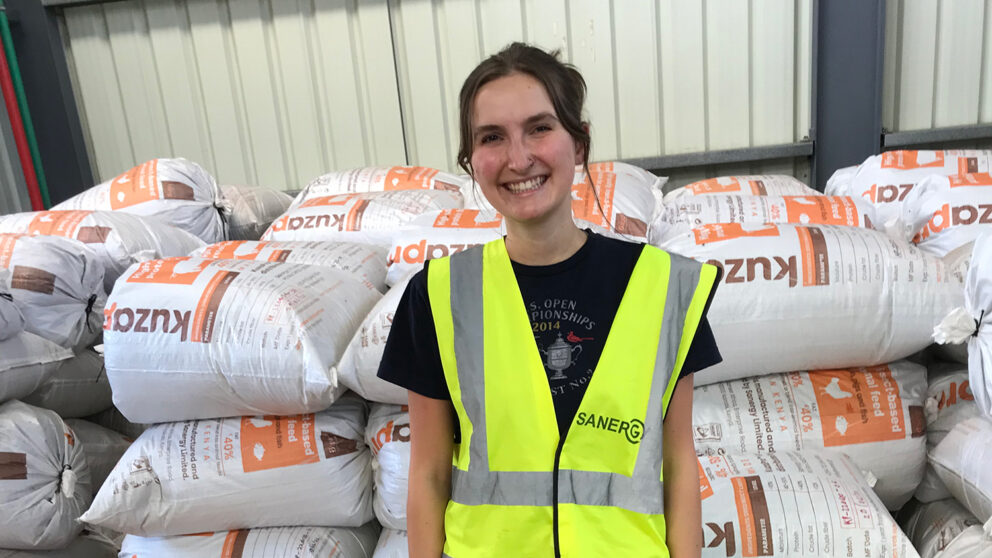Camille Brule is a rising senior majoring in paper science and engineering in the Department of Forest Biomaterials at NC State. This summer, Brule is working as a Research and Development (R&D) Discover Fellow with Sanergy in Nairobi, Kenya.
Formed to address the water sanitation crisis in the developing world and in growing cities, Sanergy offers a sustainable solution for impoverished urban communities.
Check out the Q&A below to learn more about Brule’s experience with Sanergy and the role of the College of Natural Resources in helping to prepare her for the internship.
What kinds of things are you doing during your internship?
During this internship, I’ve been designing and running my own trial through the research and development department at Sanergy. Sanergy is looking to break into the EU [European Union] market for selling their animal feed, and it was my project this summer to help them figure out the logistics of completing this goal. It started with an in-depth literature review and deep dive into EU policy regarding livestock feed and animal regulations on importation. I then designed the trials we would run to test different types of feed to the larvae. During the 12-day trials, I worked with operators, collected daily data points and monitored conditions of the trial to make sure results would be conclusive. Through every step of the process, I was presenting my progress to the R&D team and collaborating with coworkers.
How did you find out about this internship and why were you interested in it?
I have always been passionate about the right to clean sanitation, but didn’t know how I could use my degree to pursue it. Through talking with a family friend about grad school, she told me about the company she worked for, Sanergy, and how social impact engineering has shaped her career. I was immediately drawn to the idea and did research into the company. After doom-scrolling through all things Sanergy, I decided to give it a shot and send in my application for a summer fellowship. I ended up securing an interview and have now spent my summer working for Sanergy in Nairobi.
In what ways did the College of Natural Resources prepare you for this internship?
The College of Natural Resources prepared me for this internship by giving me a solid foundation and strong relationships back at home. In preparing to leave for this summer, I was a nervous wreck. Without the encouragement and support of the faculty, I truly don’t know if I would have been able to make it here. It is women like Paula Harrod and Brittany Hayes that show me everyday how much they care for their students in the College of Natural Resources, and show me that I can do anything I set my mind to.
What are your long-term goals and how does this internship factor in?
My long term goals are to get a Ph.D., and continue working in the WASH (water, sanitation, and hygiene) sector, specifically in menstrual hygiene and health. Through this internship, I got the opportunity to visit a local primary school for Menstrual Hygiene Day and listened as someone from the ministry of health spoke to the girls, aged 11-14, about how to be clean and healthy during your period. The talk ended with us handing out free pads to the girls. In school, I’ve been in two different menstrual equity clubs, We Bleed Red and PERIOD, and volunteer at the women’s shelter in Raleigh. I was encouraged through this summer experience to continue pursuing menstrual health and to find the intersection between water sanitation rights and menstrual health equity.
What’s the most important thing you’ve learned while at NC State?
The most important thing I’ve learned while at NC State is how to be confident in myself and navigate new circumstances. I learned this through my peers, professors and extra curricular activities. Through my four years at NC State, I’ve formed incredible relationships with professors and faculty that I never could have imagined. It is with their support and guidance that I was able to confidently come to Kenya this summer, and face the challenges I met — and there have been a lot this summer — head on.
This post was originally published in College of Natural Resources News.
